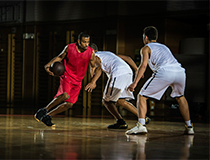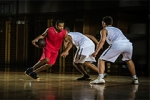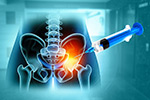
"March Madness" is arguably one of the most anticipated athletic events of the year. Amid all the excitement and "madness" that will be part of this sporting extravaganza, injuries are bound to occur and can play a decisive factor in determining which team will win the coveted championship. In our desire to emulate our heroes on the basketball court, let's ensure we do not suffer similar injures. Here is a look at common basketball injuries and what we can do to prevent them:
Foot and Ankle Injuries: These are the most common injuries that can occur on the basketball court. They can occur when landing wrongly after a jump, rolling an ankle while running, or accidently being stepped on or kicked. Make sure you are wearing proper supportive footwear. Your shoes should also give you adequate grip on the court surface to prevent slipping. If you are prone to ankle injuries, you can wrap them with athletic tape for added protection.
Knee Injuries: Severe knee injuries are not as common in basketball compared to other contact sports; however, minor knee strains and sprains are quite prevalent. Working out in the gym to strengthen the muscles around the knee will help protect the joint. Leg extensions, hamstring curls, and partial squats are all excellent for knee protection. Using a knee brace is also a good idea if you have bad knees.
Thigh and Hip Injuries: These injuries occur because of sudden pivoting, rebounding, jumping, and running, which can cause overextension of thigh and hip muscles. Ensuring your thigh and hip muscles are adequately warmed up and stretched will greatly reduce the risk of injury.
Hand and Wrist Injuries: With all the dribbling, passing, shooting, and catching involved, keeping your hands and wrists injury free is critical to your success on the basketball court. It's all about awareness and keeping your eye on the ball at all times. Looking away before the ball is securely in your hands can frequently result in a jammed finger.
Face and Head Injuries: Accidentally bumping heads or getting hit in the face with an elbow or the ball itself can be quite painful. Other than being aware of where other players are, there is not much you can do to avoid such injuries. After a head injury, you must be careful to watch for concussion symptoms. Seek help from a medical professional if you experience any clumsiness, confusion, slurring of speech, blurry vision, or vomiting.
Dr. Domb is a nationally recognized orthopaedic surgeon specializing in sports medicine and arthroscopic surgery of the hip, shoulder and knee. A noted pioneer in advanced new techniques in hip arthroscopy, he delivers innovative treatments for patients with hip injuries such as impingement and labral tears. Dr. Domb is also an expert in arthroscopic surgery of the shoulder and knee, adept in specialized techniques including arthroscopic rotator cuff repair and all-inside ACL reconstruction.





